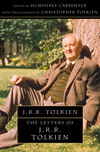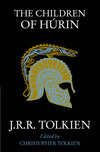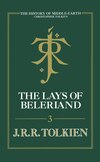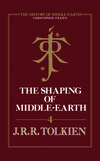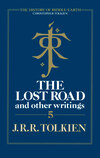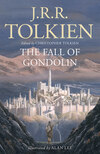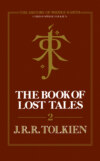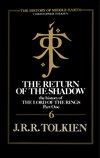Buch lesen: «The Letters of J. R. R. Tolkien», Seite 9
59 From an airgraph to Christopher Tolkien
5 April 1944 (FS 14)
I have seriously embarked on an effort to finish my book, & have been sitting up rather late: a lot of re-reading and research required. And it is a painful sticky business getting into swing again. I have gone back to Sam and Frodo, and am trying to work out their adventures. A few pages for a lot of sweat: but at the moment they are just meeting Gollum on a precipice. What a lot of work you put into the typing, and the chapters written out so beautifully! I wish I still had my amanuensis and critic near at hand.
60 To Christopher Tolkien (airgraph)
[Christopher had now arrived in South Africa, and was at a camp in the Transvaal.]
13 April 1944 (FS 15)
20 Northmoor Road, Oxford
Dearest: your Airletter of 25 March (?), postmd. 28th, arrived this morning: very welcome. By now you should be getting news from me: have been writing about twice a week. I don’t comment on your letter, though I am v. sorry. Know how you feel! Especially about cancelled leave. Your letter was ‘deur Sensor oopgemak’1 by the way. You do not seem to have done anything very useful since September! I miss you hourly also, and am lonely without you. I have friends, of course, but can seldom see them. Things a bit easier for me now, though. Helped in the admission of cadets today (as big a bunch as ever), but as far as I can see they will not concem me further this term – joy! I did see C.S.L. & Charles Williams yesterday for almost 2 hours (cut short by having to meet M. & P.2 for lunch at 12.20, which proved unobtainable so that we had to return home). I read my recent chapter: it received approbation. I have begun another. Shall have spare copies typed, if possible, & sent out to you. Don’t think there’s more news at moment. . . . . Am actually going out tonight to Magdalen: C.S.L., Warnie3 (writing a book: it’s catching), C.W., David Cecil,4 and prob. the Useless Quack (still bearded and uniformed): quite an event for me. . . . . Now I will return to Frodo & Gollum for a brief spell. More tomorrow, when this shall go off. . . . . Saturday 15th. I’m afraid this didn’t get off. I had a very pleasant time on Thurs. All turned up except Cecil, & we stayed until after midnight. The best entertainment proved to be the chapter of Major Lewis’ projected book – on a subject that does not interest me: the court of Louis XIV; but it was most wittily written (as well as learned). I did not think so well of the concluding chapter of C.S.L.’s new moral allegory or ‘vision’, based on the mediæval fancy of the Refrigerium, by which the lost souls have an occasional holiday in Paradise. Yesterday morning I managed to get an hour or two writing, & have brought Frodo nearly to the gates of Mordor. Afternoon lawn-mowing. Mrs. C.5 arrived safely from Carmarthen on Thurs. bringing gifts comestible. . . . . I had a pretty wearing time on ‘exercise’ up till 10 p.m. & then supped with the family, & then went to ‘sleep’ at area H.Q. That I did not manage: I had hardly a wink. Post is right on main road: very noisy all night. . . . . M. & I are going to have tea with the Nichol Smiths6 today, & I am supping with Elaine,7 and others at a small don-party. Quite a week for me. But term begins next week, & proofs of Wales papers8 have come. Still I am going to continue ‘Ring’ in every salvable moment. . . . .
61 From a letter to Christopher Tolkien
18 April 1944 (FS 17)
It has been a great event to-day, all your crowd of letters arriving, and much delaying the eating of breakfast. . . . . Your accounts, which were uncensored, distressed but did not surprise me. How it reminds me of my own experience! Only in one way was I better off: wireless was not invented. I daresay it had some potential for good, but it has in fact in the main become a weapon for the fool, the savage, and the villain to afflict the minority with, and to destroy thought. Listening in has killed listening. I can only hope you won’t have any more Altmarks!1 I was always against your choice of service (on the ground it seems a war behind); but at least it should not later land you often in to the animal horror of the life of active service on the earth – such as trenchlife as I knew it. Even HP2 were a Paradise to that and the Altmark not (prob.) much worse. At least at present you are getting an occasional chance to read. I am glad. God bless you. Ðys dógor þu geþyld hafa wéana gehwylces, swá ic þé wéne to.3 If the censor (and you) will permit me to quote an ancient English poet – and I can’t help thinking it comes better from father to son, than from young Béowulf, about your age, to old greybeard Hrothgar! Úre æghwylc sceal ende gebidan worolde lífes: wyrce se þe móte domes laer déaþe.4 Cold stern counsel; and much depends on ‘he who may’, and on what you consider to be dóm.
I am surprised that, tasting and disliking the very opposite, you should also dislike the ‘manners’ of life 150 years ago (nearly) as depicted by Jane [Austen]. Little is left of it all, save a few remnants of table-manners (among a decreasing minority). But actually they made life a lot easier, smoother, and less frictional and dubious; and cloaked or indeed held in check (as table-manners do) the everlasting cat, wolf, and dog that lurk at no great depth under our social skin. . . . .
I hope to see C.S.L. and Charles W. tomorrow morning and read my next chapter – on the passage of the Dead Marshes and the approach to the Gates of Mordor, which I have now practically finished. Wasted some time on Sunday answering a letter from the Eighth Army (!). I get a good many of the kind, but this one was rather amusingly written. The ‘Regius Professor of English’ was asked to adjudicate on a dispute which was rending the Mess of a certain light A.A. Regt R.A. into a faction-war: how to pronounce the name of the poet Cowper. Big Money hangs on the issue. The letter was from the adjutant (who appeared to have read the poet, even The Task, ‘in his wayward youth’). I can’t help thinking that the Army shows spots of more wit and intelligence – you may one day strike some in your service (mais je le doute). Deeming it below the dignity of a ‘Regius Prof.’ to adjudicate on Big Money, I sent as Delphic an oracular reply as I could, giving the adjt. a good deal more facts, I expect, than he wanted. Not of course that there is any doubt that the poet called himself Cooper (of which his name is merely the older spelling): oup, owp spells oop in English: there are no aups (in Latin value): so stoup, group, soup and formerly also droup, stoup (verb), troup, coup(er), whouping-cough, loup, etc. (not to mention roum, toumb). Yesterday I had a visit from F. Pakenham,5 getting up a combined Christian Council of all denominations, for this city, as now in 50 others. I joined, but refused the proffered secretaryship (you bet!). Term has almost begun: I tutored Miss Salu6 for an hour. The afternoon was squandered on plumbing (stopping overflow) and cleaning out fowls – less grudgingly, as they are laying generously (9 again yesterday). A lovely morning dawned on us this morn. A mist like early Sept. with a pearl-button sun (8 a.m. being really 6 a.m.) that soon changed into serene blue, with the silver light of spring on flower and leaf. Leaves are out: the white-grey of the quince, the grey-green of young apple, the full green of hawthorn, the tassels of flower even on the sluggard poplars. The narcissuses are a marvellous show, but the grass grows so quick that I feel like a barber faced with a never-ending queue (& not a chinaman’s either, to be trimmed with one snip).
I cannot tell you how I miss you, dear man. I would not mind it, if you were happier or more usefully employed. How stupid everything is!, and war multiplies the stupidity by 3 and its power by itself: so one’s precious days are ruled by (3x)2 when x=normal human crassitude (and that’s bad enough). However, I hope that in after days the experience of men and things, if painful, will prove useful. It did to me. As for what you say or hint of ‘local’ conditions: I knew of them. I don’t think they have much changed (even for the worse). I used to hear them discussed by my mother; and have ever since taken a special interest in that part of the world. The treatment of colour nearly always horrifies anyone going out from Britain, & not only in South Africa. Unfort. not many retain that generous sentiment for long. I don’t say anything about home conditions. You will (I suppose) hear on radio as much as I could say. We are all well at the moment. We are waiting. I wonder for how long now. Not long I think. I see from paper that Air Crew training in Canada is being cut: fewer A.C. generally are now to be trained. I thought I guessed from your letter that you do not now expect to come to G. B. to finish. I hope that is not so. But who knows? We are in God’s hands. Our lot has fallen on evil days: but that cannot be by mere ill chance. Take care of yourself in all due ways (aequam serva mentem, comprime linguam7). . . .
62 From an airgraph to Christopher Tolkien
23 April 1944 (FS 18)
I read my second chapter, Passage of the Dead Marshes, to Lewis and Williams on Wed. moming. It was approved. I have now nearly done a third: Gates of the Land of Shadow. But this story takes me in charge, and I have already taken three chapters over what was meant to be one! And I have neglected too many things to do it. I am just enmeshed in it now, and have to wrench my mind away to tackle exam-paper proofs, and lectures (beginning on Tuesday).
63 To Christopher Tolkien
24 April 1944 (FS 19)
20 Northmoor Road, Oxford
My dearest Chris,
Your airletter. . . . arrived at breakfast this morn. I had the uncommon luxury of lying a-bed with toast and home-made marmalade (a good many oranges and lemons lately) and your letter. St George’s day passed uneventfully; I sat up ‘on duty’ till 1.30 this morn, and then decided to retire: it is so warm one can sleep with open windows and hear alerts. I was drawing my curtains when I noted a v. white light S.W., and I was just putting foot in much desired sheets when Ulysses’ Peril1 let off her wail. Did not in fact get to bed till past 3.30, or sleep till 4, or wake till 8.45, or get up till 9.45. . . . . I spent what was left of this morning in town doing odd jobs, among them that of getting my head-harvest reaped: a big crop: still fertile soil evidently. Mitre2 was locked! Have not tasted beer since Thursday last when our barrel ran dry, & has not yet been replaced. I have to lecture tomorrow, so now I must stop for the moment. . . . .
Wed. 26 April. . . . . Yesterday felt effects of Sunday night. Went off early to town and did some executor’s business for Mrs Wright,3 gave a poor lecture, saw the Lewises and C.W. (White Horse) for ½ hour; mowed three lawns, and wrote letter to John, and struggled with recalcitrant passage in ‘The Ring’. At this point I require to know how much later the moon gets up each night when nearing full, and how to stew a rabbit! No Lewis this morning, as he has been appointed Clarke Lecturer in Cambridge, and leaves early to lecture there at 5 p.m. on Wednesdays. . . . .
3.45 Wed. A record college meeting (12½ mins.)! Arrived back to find Biddy had broken another egg (about the 7th), so, despairing that the ‘henwife’ would attend to it, I have spent an agreeable time catching her (i.e. the bird), cleaning her, trimming her and disinfecting her – and then disinfecting myself. Grr! The fourth lawn will have to wait. I was pleased that you managed to get some church at the end of Holy Week, though not too pleased with your Even-christians (as they called ‘em in O. & M.E.).4 However that cannot be helped. The only salve is the sudden reflection that one of them is prob. making an adverse judgement on oneself, not unreasonable as founded on one’s looks and deportment, but as wide of the mark of the inner self as our own are! God ána wát.5 But as for sermons! They are bad, aren’t they! Most of them from any point of view. The answer to the mystery is prob. not simple; but part of it is that ‘rhetoric’ (of which preaching is a dept.) is an art, which requires (a) some native talent and (b) learning and practice. The instrument used is v. much more complex than a piano, yet most performers are in the position of a man who sits down to a piano and expects to move his audience without any knowledge of the notes at all. The art can be learned (granted some modicum of aptitude) and can then be effective, in a way, when wholly unconnected with sincerity, sanctity etc. But preaching is complicated by the fact that we expect in it not only a performance, but truth and sincerity, and also at least no word, tone, or note that suggests the possession of vices (such as hypocrisy, vanity) or defects (such as folly, ignorance) in the preacher.
Good sermons require some art, some virtue, some knowledge. Real sermons require some special grace which does not transcend art but arrives at it by instinct or ‘inspiration’; indeed the Holy Spirit seems sometimes to speak through a human mouth providing art, virtue and insight he does not himself possess: but the occasions are rare. In other times I don’t think an educated person is required to suppress the critical faculty, but it should be kept in order by a constant endeavour to apply the truth (if any), even in cliché form, to oneself exclusively! A difficult exercise. . . . .
I was much amused by your account of your journey to Jo’burg on Maundy Thursday. . . . . If you fetch up at Bloemfontein I shall wonder if the little old stone bank-house (Bank of South Africa) where I was born is still standing. And I wonder if my Father’s grave is there still. I have never done anything about it, but I believe my mother had a stone-cross put up or sent out.6 (A. R. Tolkien died 1896). If not it will be lost now, prob., unless there are any records. . . . .
64 To Christopher Tolkien
30 April 1944 (FS 20)
20 Northmoor Road, Oxford
My dearest:
I have decided to send you another air letter, not an airgraph, in the hope that I may so cheer you up a little more. . . . . I do miss you so, and I do find all this mighty hard to bear on my own account and on yours. The utter stupid waste of war, not only material but moral and spiritual, is so staggering to those who have to endure it. And always was (despite the poets), and always will be (despite the propagandists) – not of course that it has not is and will be necessary to face it in an evil world. But so short is human memory and so evanescent are its generations that in only about 30 years there will be few or no people with that direct experience which alone goes really to the heart. The burnt hand teaches most about fire.
I sometimes feel appalled at the thought of the sum total of human misery all over the world at the present moment: the millions parted, fretting, wasting in unprofitable days – quite apart from torture, pain, death, bereavement, injustice. If anguish were visible, almost the whole of this benighted planet would be enveloped in a dense dark vapour, shrouded from the amazed vision of the heavens! And the products of it all will be mainly evil – historically considered. But the historical version is, of course, not the only one. All things and deeds have a value in themselves, apart from their ‘causes’ and ‘effects’. No man can estimate what is really happening at the present sub specie aeternitatis. All we do know, and that to a large extent by direct experience, is that evil labours with vast power and perpetual success – in vain: preparing always only the soil for unexpected good to sprout in. So it is in general, and so it is in our own lives. . . . . But there is still some hope that things may be better for us, even on the temporal plane, in the mercy of God. And though we need all our natural human courage and guts (the vast sum of human courage and endurance is stupendous, isn’t it?) and all our religious faith to face the evil that may befall us (as it befalls others, if God wills) still we may pray and hope. I do. And you were so special a gift to me, in a time of sorrow and mental suffering, and your love, opening at once almost as soon as you were born, foretold to me, as it were in spoken words, that I am consoled ever by the certainty that there is no end to this. Probable under God that we shall meet again, ‘in hale and in unity’, before very long, dearest, and certain that we have some special bond to last beyond this life – subject of course always to the mystery of free will, by which either of us could throw away ‘salvation’. In which case God would arrange matters differently!. . . .
On Thursday I gave 2 lectures and had some troublesome business in town and was too tired to attend the Lewis séance. I hope to see him tomorrow, and read some more of ‘the Ring’. It is growing and sprouting again (I did a whole day at it yesterday to the neglect of many matters) and opening out in unexpected ways. So far in the new chapters Frodo and Sam have traversed Sarn Gebir, climbed down the cliff, encountered and temporarily tamed Gollum. They have with his guidance crossed the Dead Marshes and the slag-heaps of Mordor, lain in hiding outside the main gates and found them impassable, and set out for a more secret entrance near Minas Morghul (formerly M. Ithil). It will turn out to be the deadly Kirith Ungol and Gollum will play false. But at moment they are in Ithilien (which is proving a lovely land); there has been a lot of bother about stewed rabbit; and they have been captured by Gondorians, and witnessed them ambushing a Swerting army (dark men of South) marching to Mordor’s aid. A large elephant of prehistoric size, a war-elephant of the Swertings, is loose, and Sam has gratified a life-long wish to see an Oliphaunt, an animal about which there was a hobbit nursery-rhyme (though it was commonly supposed to be mythical). In the chapter next to be done they will get to Kirith Ungol and Frodo will be caught. Here is the rhyme cited by Sam: Grey as a mouse,/Big as a house,/Nose like a snake,/I make the earth quake,/As I tramp through the grass;/Trees crack as I pass./With horns in my mouth/I walk in the South/Flapping big ears./Beyond count of years/I’ve stumped round and round,/Never lie on the ground,/Not even to die./Oliphaunt am I,/Biggest of All,/huge, old, and tall./If ever you’d met me,/You wouldn’t forget me./If you never do,/You won’t think I’m true;/But old Oliphaunt am I,/and I never lie. I hope that has something of the ‘nursery rhyme’ flavour. On the whole Sam is behaving well, and living up to repute. He treats Gollum rather like Ariel to Caliban. . . . .
It is full Maytime by the trees and grass now. But the heavens are full of roar and riot. You cannot even hold a shouting conversation in the garden now, save about 1 a.m. and 7 p.m. – unless the day is too foul to be out. How I wish the ‘infernal combustion’ engine had never been invented. Or (more difficult still since humanity and engineers in special are both nitwitted and malicious as a rule) that it could have been put to rational uses – if any. . . . .
Now we can only link with this flimsy bit of paper! But may it speed to you and arrive safely. I wish that it might be written in Runes beyond the craft of Celebrimbor of Hollin, shining like silver, filled with the visions and horizons that open in my mind. Though I have without you no one to speak my thought. I first began to write the ‘H. of the Gnomes’1 in army huts, crowded, filled with the noise of gramophones – and there you are in the same prison. May you, too, escape – strengthened. Take care of yourself, in soul and body, in all ways proper and possible, for the love that you have to your own Father.
